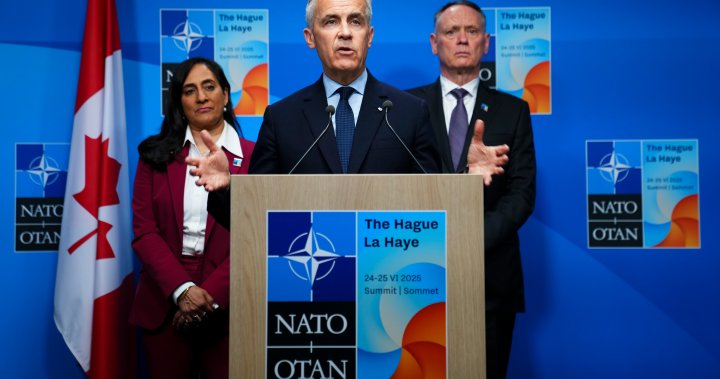Prime Minister Mark Carney says the world faces “turning points” as he vowed Canada will benefit from increasing defence spending to the new NATO target of five per cent of GDP by 2035.
At the same time, he acknowledged he will need “social licence” for the level of spending planned and that the country will need to consider the “trade-offs” down the road.
“Throughout Canada’s history, there have been turning points when the world’s fortunes have been in the balance, and each time Canada has chosen to step up, to lead on the path of democracy and freedom,” Carney said. “We’re once again in one of those moments. If we want the world of tomorrow to be shaped by our values, Canada must be ready. If we want a more secure world, we need a stronger Canada.”
Carney made the comments after NATO leaders agreed to hike the defence spending target from two per cent of GDP to the new five per cent target.
He was asked by reporters whether Canadians would need to make sacrifices to afford that spending, such as cuts to health-care transfers.
“The investments we’re making in defence and security, broader security, given the new threats that Canada faces, we’re not at a trade-off, we’re not at sacrifices in order to do those, these will be net additive,” he said.
“More of this will happen in Canada, more of it will build our economy at the same time as it improves our defence and we’ll get the benefits.”
Get daily National news
Get the day’s top news, political, economic, and current affairs headlines, delivered to your inbox once a day.
However, he said as the world gets closer to the 2035 deadline for that five per cent target, the country will ultimately need to think about potential “trade-offs.”
“We will have to make considerations about what less the federal government can do in certain cases and how we’re going to pay for it,” Carney said.
“Those trade-offs — I’m going to give you false precision around this — but those trade-offs happen towards the end of the decade into the next decade and we will be much, much better informed.”
The NATO agreement will see allies invest 3.5 per cent in core defence needs, such as jets and weapons, and 1.5 per cent in defence-adjacent areas, such as infrastructure.
Up until this year, Canada has struggled to meet the previous two per cent goal set by NATO and Carney said the new five per cent target will equate to spending on defence of about $150 billion.
NATO said in 2024 Canada spent $41 billion.
Carney said he recognizes that the federal government needs to establish political and “social licence” for that kind of increase in spending.
“First and foremost, we are protecting Canadians, we are protecting Canadians against new threats,” he said. “I wish we didn’t have to, but that is what we have to and it is our core responsibility as government.”
He said those threats are evolving, noting concerns about Arctic security.
But while the costs from defence spending will increase, the prime minister argued “maximum spillovers” will come from it, such as through new jobs for Canadians.
NATO Secretary-General Mark Rutte said there was a “concrete” plan for allies to spend five per cent of GDP to make NATO stronger, with the alliance’s head saying allies will agree to further increase defence production so their armed forces have “everything they need.”
Carney told CNN International on Tuesday that Canada would reach the target in part by developing deposits of critical minerals and that some of the work would be done in partnership with the European Union, EU member states, the U.K. and other allies.
When asked Wednesday about his comments regarding “trade-offs” coming later, he said if spending is hiked in one area, it could lead to more spending on rising prices and “choke points,” but working with international partners can help circumvent this.
“That’s part of the reason why we’re co-operating more closely with the Europeans, part of the reason why we continue co-operation with the U.S. in the right areas,” he said. “But also part of the reason why this increase will happen at a measured pace or we’ll try to do it at a measured pace and that has that consequence.”
Before Wednesday’s meeting, Britain, France, the Netherlands and Germany had all committed to the five per cent goal. NATO countries closer to the borders of Ukraine, Russia and its ally Belarus had also pledged to do so.
Some countries, like Spain and Slovakia, expressed concerns with the target.
All 32 NATO member countries had to agree on a new spending target and had to debate the timeline for its implementation.
Rutte warned on Monday that no country can opt out of the target and that progress made toward the new target will be reviewed in four years.
© 2025 Global News, a division of Corus Entertainment Inc.
Carney says world is at ‘turning points’ as he touts defence spending boost


